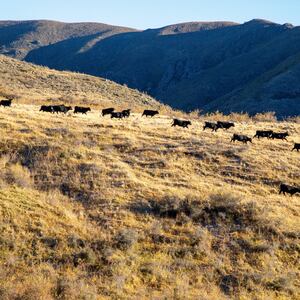World
Molesworth Station Continues Fight Against Bovine Tuberculosis

Molesworth Station, New Zealand’s largest working farm, is actively combating bovine tuberculosis (TB) despite recent progress. In April 2023, the expansive property, which spans from inland Blenheim to Hanmer Springs, reported its cattle were free from TB for the first time in nearly 40 years. This milestone, however, is tempered by ongoing challenges as the station remains under strict surveillance protocols.
The Operational Solutions for Primary Industries (Ospri) confirmed that although the cattle were declared free of TB, the herd will continue to be monitored under its comprehensive “TBfree programme.” Current restrictions on livestock movement remain in effect as a precautionary measure.
According to Ospri, one infected animal, a three-year-old, has been identified through continued surveillance testing. The organization noted that testing is currently being conducted on the rest of the herd to ensure the disease does not spread further. This proactive approach aims to protect both the livestock and the wider agricultural community from potential outbreaks.
Background on Bovine Tuberculosis in New Zealand
Bovine tuberculosis has posed a significant threat to the farming industry in New Zealand, impacting both animal health and agricultural productivity. The disease is primarily spread through direct contact between infected animals or through contaminated environments. In recent decades, extensive efforts have been made to manage and control its prevalence across the country.
Molesworth Station’s declaration of freedom from TB is a testament to the effective measures implemented by the farming community and the support from organizations such as Ospri. The station, which covers over 180,000 hectares, plays a crucial role in New Zealand’s agricultural landscape, contributing to the economy and food production.
Despite the challenges posed by the recent discovery of an infected animal, the management at Molesworth Station remains optimistic. They continue to adhere to stringent biosecurity practices and remain committed to maintaining the health of their livestock.
Future Steps and Community Impact
The impact of bovine tuberculosis extends beyond individual farms; it affects the entire agricultural sector. Farmers across New Zealand rely on healthy livestock for their livelihoods, and any outbreak poses significant financial risks. As a result, Ospri’s surveillance efforts are vital not only for Molesworth Station but for the broader farming community.
The ongoing testing and monitoring are crucial to preventing further cases of TB. Farmers are encouraged to report any signs of illness in their herds promptly, ensuring that swift action can be taken to mitigate risks.
In conclusion, while Molesworth Station has made significant strides in combating bovine tuberculosis, the fight is far from over. With continued vigilance and cooperation from the farming community, New Zealand aims to keep its livestock healthy and secure, ensuring the future of its agricultural industry.
-

 World3 months ago
World3 months agoTest Your Knowledge: Take the Herald’s Afternoon Quiz Today
-

 Sports3 months ago
Sports3 months agoPM Faces Backlash from Fans During Netball Trophy Ceremony
-

 Lifestyle3 months ago
Lifestyle3 months agoDunedin Designers Win Top Award at Hokonui Fashion Event
-

 Sports3 months ago
Sports3 months agoLiam Lawson Launches New Era for Racing Bulls with Strong Start
-

 Lifestyle3 months ago
Lifestyle3 months agoDisney Fan Reveals Dress Code Tips for Park Visitors
-

 Health3 months ago
Health3 months agoWalking Faster Offers Major Health Benefits for Older Adults
-

 World3 months ago
World3 months agoCoalition Forms to Preserve Māori Wards in Hawke’s Bay
-

 Politics3 months ago
Politics3 months agoScots Rally with Humor and Music to Protest Trump’s Visit
-

 Top Stories3 months ago
Top Stories3 months agoUK and India Finalize Trade Deal to Boost Economic Ties
-

 Entertainment3 months ago
Entertainment3 months agoExperience the Excitement of ‘Chief of War’ in Oʻahu
-

 World3 months ago
World3 months agoHuntly Begins Water Pipe Flushing to Resolve Brown Water Issue
-

 Science3 months ago
Science3 months agoNew Interactive Map Reveals Wairarapa Valley’s Geological Secrets









